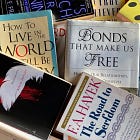Love is the Realization of Our Shared Being
All human beings are flawed, and at times, we experience painful disappointment when our expectations are not met.
An earlier version of this essay was originally published at the Foundation for Economic Education
The title of this essay comes from an interview with Rupert Spira. Rupert is pointing us to consider the underlying nature of Reality, where everything is interconnected. We seek transcendence, be it through relationships, art, music, or nature, because that is when we feel most at peace.
We feel at peace because we have at least temporarily stopped our searching for an object to make us happy.
But when we forget that the object of love can’t make us happy, we begin to construct expectations of a deal our loved one must fulfill.
What started as an I-Thou relationship then evolves into an I-It relationship, marked by conflict and misery. (See our Mindset Shift U archives for our sessions on Bond That Make Us Free)
The more unwavering our trust in our perceptions, which are filtered to conform to our existing misconceptions, the more misery and conflict we create. In our upcoming Classical Wisdom sessions, Epictetus, David Hume, and Adam Smith will help us see reality more clearly.
Given our conflict with Reality, it’s no wonder that up to 50% of marriages in the United States fail.
In his book The All or Nothing Marriage, psychology professor Eli Finkel describes the increasing expectations that strain marriages: “In contrast to our predecessors, who looked to their marriage to help them survive, we look to our marriage to meet our needs for passion and intimacy and to facilitate our voyages of self-discovery and personal growth.”
With material needs met, the desire for “self-actualization” is natural. Still, Finkel’s research confirms what we probably already suspect: “Just as we have increasingly looked to our marriage to help us fulfill higher-level needs, we have decreasingly invested the time and energy required for the marriage to meet these expectations.”
We still believe in romantic relationships, but we often don’t appreciate the effort that is required to build a healthy one. Worse yet, in combination with investing less time, we frequently hold dysfunctional mindsets about relationships.
“Most people,” observed social psychologist Erich Fromm in his book The Art of Loving, “see the problem of love primarily as that of being loved, rather than that of loving, of one’s capacity to love.”
Do you?
Perhaps you hold a destiny mindset about relationships? A destiny belief, according to psychologist Raymond Knee, leads to an idea that your partner in a relationship either is or isn’t “meant to be.” Finkel writes, “The science is clear that holding strong destiny beliefs is perilous” since, as Knee observes, those who hold a destiny belief get disillusioned quickly when they meet with difficulties in their relationship.
Finkel is not trying to take the romance out of relationships. We all know the infatuation phase of a new relationship; the problem is when the inevitable challenging times occur.
Many relationships begin with infatuation and end when the reality of everyday living bumps up against our mental images. In his book The Course of Love, philosopher Alain de Botton writes, “We may so often have seen our partner pushing a buggy, arguing with a toddler, crossly berating the electricity company and returning home defeated from the workplace that we have forgotten that dimension in him or her that remains adventurous, impetuous, cheeky, intelligent, and above all else, alive.”
“The essential error of infatuation,” writes Botton, is “a failure to keep in mind a central truth of human nature”:
Everyone — not merely our current partners, in whose multiple failings we are such experts — but everyone will have something substantially and maddeningly wrong with them when we spend more time around them, something so wrong as to make a mockery of those initially rapturous feelings.
In other words, all human beings are flawed, and at times, we experience painful disappointment when our expectations are not met. It isn’t that all relationships will survive, but Botton reminds us that fulfillment is reached “not by avoiding pain, but by recognizing its role as a natural, inevitable step on the way to reaching anything good.”
Day after day, our partner may violate our expectations. “Countless times over the course of a day, a year, or a marriage,” observes Finkel, “we generate an explanation for why a partner enacted a given behavior.” The explanations we construct via our thinking will go a long way towards determining whether our relationships flourish.
The worst type of explanation, according to Finkel’s research, is one that involves attributing a stable internal characteristic to your partner, a fixed attribute or disposition. For example, your partner arrives late to an event that is important to you. You never understand what is important to me flashes through your mind. With that thought, you have attributed the behavior to a fixed disposition. Having made that attribution, it is easy to feel terrible about the relationship. Less corrosive is a temporary, external explanation for the behavior: “My partner was stuck in traffic.”
We are not up to the task of judging, and our judgments eat away at our relationships. “Perceiving our partner’s motives with precise accuracy has value but doing so is virtually impossible,” explains Finkel, “and the tendency to misperceive benign motivation as malignant can trigger an escalating cycle of conflict and negativity.”
When my wife works from home, she, like me, becomes very focused and doesn’t like to be interrupted. If I interrupt, I can expect a curt reply. Her curtness has nothing to do with me; she has a deadline, and if I am more considerate and wait for a more opportune time, she will again be her charming self. If I take her blunt response personally and get lost in my own thoughts, an insignificant event can become upsetting.
Thus, Finkel advises us to assume good intentions: “If we are confident that our partner is, by and large, a decent person who wants to do well by us, there is a strong argument that we should seek to make attributions that give him or her the benefit of the doubt.”
Finkel asks us to make “a deliberate effort to see the beautiful underneath the anger and disappointment and boredom — to look with (appreciative) new eyes.”
In the face of significant conflicts, Finkel recommends that partners consider a conflict in their marriage from the perspective of a neutral third party who would want the best for all involved. Ask, “How might this person think about the disagreement? How might he or she find the good that could come from it?”
Finkel doesn’t mention Adam Smith, but his advice harkens to Smith’s The Theory of Moral Sentiments, where Smith advises us to consider our actions in light of how an impartial spectator would view them.
(We will be working with selections from The Theory of Moral Sentiments in our program, Classical Wisdom for Living a Good Life.)
Of course, it is best to do this in real-time, as a conflict is brewing. Have a little willingness to doubt your interpretation, pause for a moment, and step above the fray.
Many expect their partner to make them happy. This is impossible. But a good relationship, Finkel writes, can promote “the successful pursuit of meaning.” The more meaning and purpose we build in our lives, the more happiness we experience.
Finkel builds his book, in part, on the research of Stanford psychologist Carol Dweck. In her books, such as Mindset, and her many articles, Dweck maps out two mindsets with opposing beliefs about ability and intelligence. One Dweck calls a fixed mindset, the other she calls a growth mindset. If your views about intelligence are of the fixed mindset, you believe a person’s abilities to be set in stone. If you have a growth mindset, you believe abilities can be developed and are built over time.
Understanding your mindset can increase your effectiveness in relationships. A person with a fixed mindset is frightened by challenges. They feel a constant need to prove themselves and appear successful. They would tend to hold the belief that some have a natural-born aptitude for relationship skills; thus, to make an effort in a relationship would be an admission that they are too inept to have a successful one.
If a relationship faces challenges, those with a fixed mindset tend to lose interest, shirk responsibility, and assign blame. Cultivating the capacity to love, they reason, is only for those who don’t have their natural skills.
Someone with a growth mindset will embrace challenges and see setbacks as opportunities for further learning. Specifically, the capacity to love is something they develop throughout their lifetime. Challenges provide opportunities to grow even deeper relationships.
If you have a growth mindset, the journey towards being more loving is challenging and joyous. You get out of bed curious to see what lessons life will serve up and what you can learn.
If your idea of a committed relationship is limited to a mutually favorable exchange, you will soon be bitterly disappointed. Inevitably, your “deal” will go south, and you will have buyer’s remorse.
We are not bound by our past. No matter how many times we have been mistaken, in this moment we can choose again. If you have become cynical about love, know that only mistaken beliefs are in your way, and committed relationships that promote the flourishing of both partners are possible.
If you have a fixed mindset about relationships, you can keep blundering ahead. Or, you can be open to another way. Rather than mentally demand others always behave according to your expectations, you can increase your capacity to love. This other way is simply written and easily said, but mastery of the other way is the journey of a lifetime.
Hugh Prather and Gayle Prather in their book Notes to Each Other ask this question: “Will the time come, when we won’t have to work so hard on our relationship?” They responded, “No, the time will come when there will be no lapse in our efforts. The time will come when it will be unthinkable for us to take a break from kindness.”
Today, where on your list of priorities have you placed increasing your capacity to love? What excuses do you have for allowing your efforts to lapse? Your answers will determine the quality of your relationship.
At Mindset Shifts U, we read the great works of humanity to gain actionable insights that enhance our ability to live a meaningful life.
Please consider upgrading to a paid membership so you can take part in our Classical Wisdom for Living a Good Life, which begins next Saturday. I just finished writing Session 1, and I promise you it contains an actionable mindset change that will make all the difference as you go about your daily life.







“Most people…see the problem of love primarily as that of being loved, rather than that of loving, of one’s capacity to love.”
Perhaps people learn the wrong lessons from dating…and from the ghastly modern trend of young people sharing their "expertise" about dating on Instagram and Tiktok.
Men are told that insouciance is attractive. Women are told to play hard to get, or to withhold some portion of their love and affection. Better to be the one who loves at 50% than the one who loves at 100.
Do they perhaps carry these "lessons" with them into marriage?
Just speculating. All I know is that my wife and I keep looking for new ways to express, show, and feel ever-greater love for each other, and it's really nice.
Terrific post!
One of the best observations and advice on marriages I’ve read. It should be required or at least recommended reading before any couple considers getting married.